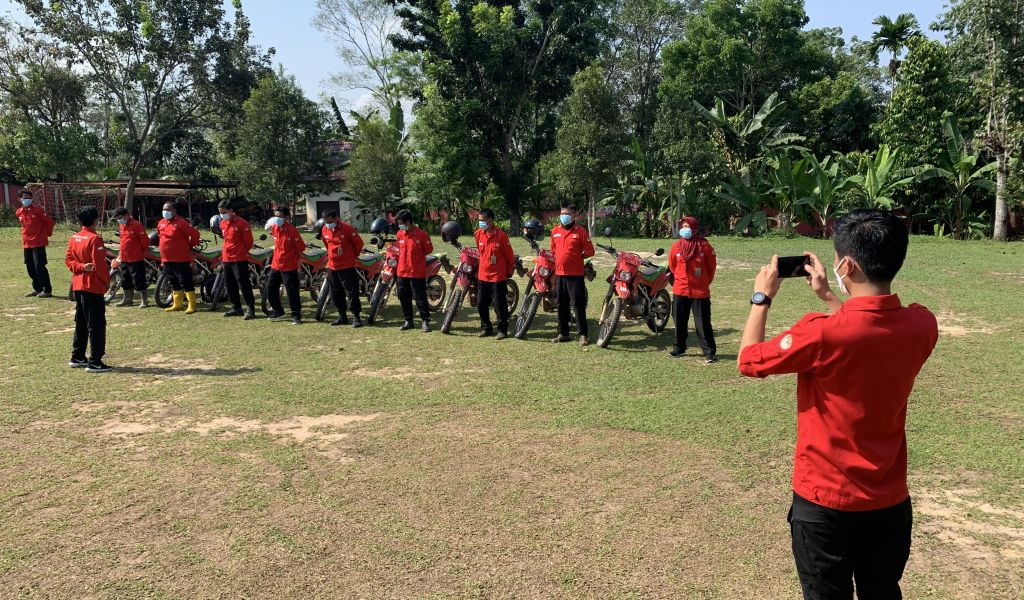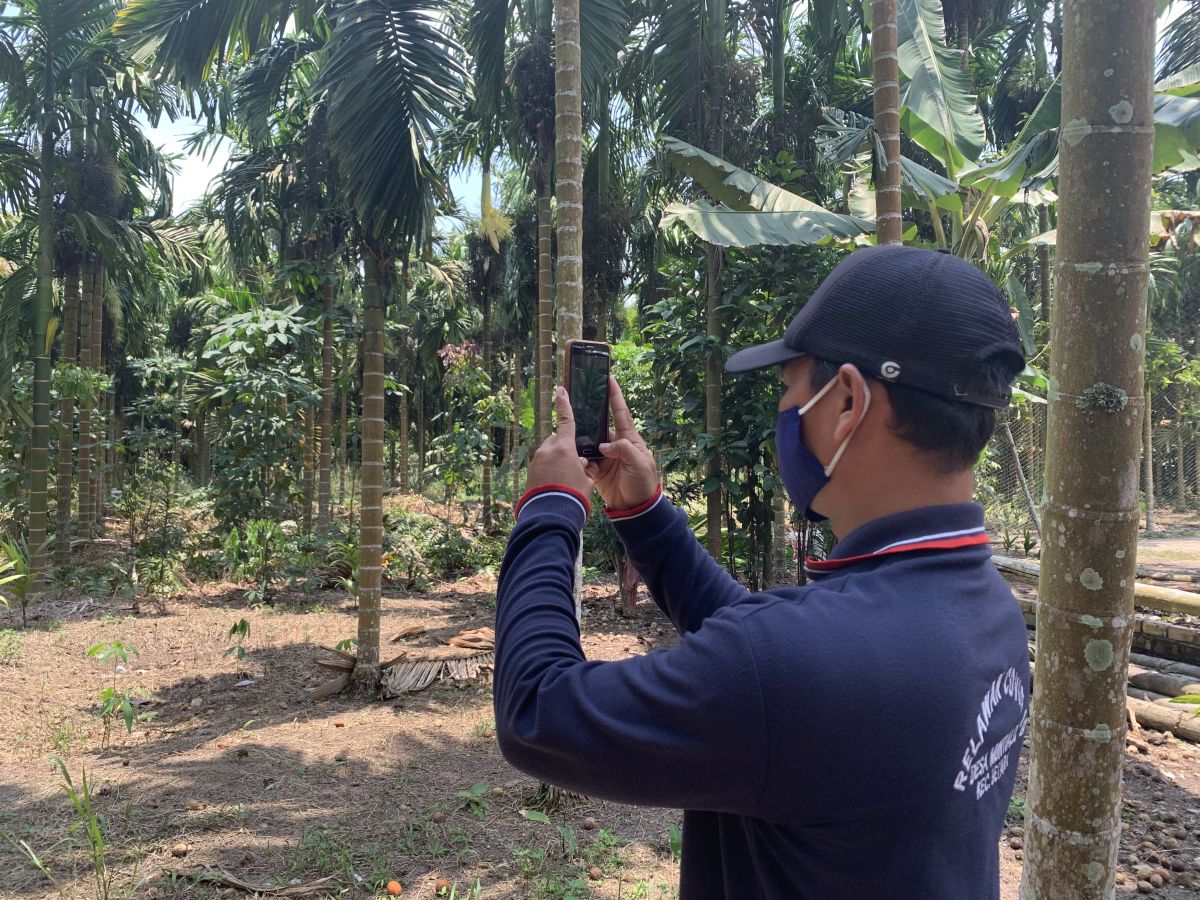TempoWitness: Community’s tool to preserve the environment and forests

The incidence of forest and land fires in Jambi Province has decreased in the last three years. Throughout 2020, fires burned 200 hectares of land, far less than the previous year's total of 39,638 hectares. According to data from the Regional Disaster Management Agency (BPBD) of Jambi Province, fires affected 173 hectares of land in the province from January to August 2021. Of these, 23 hectares were in Tanjung Barat Regency
When forest and land fires occur, the response and involvement of the community living in the locality are important. As well as being the group most affected, they are often the first to detect potential forest and land fires.
Tempo Media collaborated with RECOFTC to involve communities in Jambi in monitoring and reporting on forest and land fires. Together, they encouraged community participation in forest areas in Tanjung Barat Regency through the citizen journalism application TempoWitness. With TempoWitness, residents can share information about forest and land fires, as well as forest conservation efforts and the problems they face. In the two years since its introduction, the app has helped citizens to disseminate reliable information to the public.
Citizen journalism produces 103 reports
Citizen participation through TempoWitness began in December 2019 and January 2020. RECOFTC and TempoWitness teams provided journalism training to 20 residents in the villages Muntialo, Bram Itam Raya and Bram Itam Kanan. Training was offered to villagers involved in monitoring and controlling forest fires and environmental management. Participants ranged from government officials to housewives.
Initially, residents participated in the journalism training only as an obligation imposed by their employers. "It is difficult to find representatives in the village and the requirements [to have an Android mobile phone] are quite difficult," says Siti Umi Rosidah, Head of Administration and General Affairs, Bram Itam Kanan Village Administration.
Forest and land fire officer Sandy Prabowo, Head of the Manggala Agni Bukit Tempurung Da-Ops Office, and village official Imron Rosadi, Head of Muntialo Village Administration, admitted to participating in the training for the same reason, on the instruction of their supervisors. They were not aware of the details and purpose of the training.
“When the invitation letter for the training was sent to the head of the government, he was asked to send three representatives from the community,” says Rosadi. “At first, I had no idea what this training would be like. It was purely an order from my superiors to become a representative."
Residents and forest fire advocate Usman Hamid Salam Syamsuri received a more complete order to attend training on forest fire disaster mitigation. Syamsuri attended the training as a village representative. "I found out that training materials for the TempoWitness application as citizen's journalism were inserted, to report potential fires from community activities, or indications before fires such as drought," said Syamsuri.
Starting from an obligation to follow orders from superiors, the citizen journalism training resulted in 103 citizen reports via TempoWitness as of December 2021. Twenty-nine reports were related to forest and land fires. Equipped with new skills, citizens are using journalism to disseminate information on forest and land fires. “The application makes it easier for us to inform the public,” said Prabowo. “In addition, Tempo Media is a well-known media channel, so it is readily accepted by the public."

Barriers from inside the community
For the past two years, citizen journalists have been actively monitoring and reporting on forest and land fires in their localities as TempoWitness contributors. Their reports provide updates on activities and programs and highlight the challenges with forest and land management. The technical aspects of news production, such as collecting data, writing and editing, uploading photos, and dealing with internet connection problems, which were initially considered complicated, have become easy routines over time.
Even though writing reports and news for TempoWitness requires extra time and energy on top of their full-time jobs, participants reported that citizen journalism activities for TempoWitness supports their daily work as Aparatus Sipil Negara (ASN) or village officials.
The biggest challenges for citizen journalists come from their own environment. In the process of reporting and reporting for TempoWitness, residents encountered obstacles stemming from a culture of reluctance to challenge authority. In the early days of practising citizen journalism, the new journalists found it quite difficult.
“This application supported my work at the Regional Disaster Management Agency,” says Muhammad Yusuf, a People's Welfare staff (Ketra) of the Muara Tungkal Village Government at the time of the training. “When I became a village official, it created a conflict of interest and I was not supported by my colleagues to write reports."
This conflict and lack of support for citizen journalists affected the quality and depth of the news reported for TempoWitness. Many prefer to choose a safe path, reporting news or activities that are ceremonial in nature, rather than reporting important but potentially controversial inform.
“I am in quite a dilemma if I report on potential fires coming from the community because I will be the one to blame,” says Syamsuri. “So I often report on things that are not sensitive, such as patrol activities, land clearing without burning and village development. In the end, it is quite far from mitigating forest and land fires.”
Syamsuri and Rosidah realized that the TempoWitness training was intended to encourage information dissemination and forest fire mitigation. However, the potential for conflict and social pressure led them to play it safe, avoiding reporting on sensitive topics.
"I'm afraid that the news that I bring up will cause a commotion. For example, what is the result of puddles in the ditch, what is the garbage scattered about? It's different from event reporting, where the information is clear, such as activity reports, such as the inauguration of something, fire patrol activities, PKK activities, vaccinations," he said.
The position of residents who work for the village or other administrative agencies, can be strategic or become an obstacle. Member of the BPBD Rapid Response Task Force Yusuf is well placed to share fast and accurate information on forest and land fires. However, after he became a village official, the quality and quantity of the coverage dropped as he faces work and social pressure.
“The work requirements for village officials contradict the ethics of news reporting,” says Yusuf. “I received a warning when there was an activity and I sent a photo for documentation. Some people replied, telling me not to write about this activity."
Occupations, government agencies and the social environment often create pressure for citizen journalists. “Even though there is an anonymous feature, people know that it's me who often writes,” says Yusuf. “This makes me doubtful, despite the freedom of the press. With my occupation, my writing criticizing the government is considered unethical. Except for the news that supports the government."

The climate of information disclosure
Despite the challenges and obstacles, the TempoWitness' citizen journalism initiative has become an important information source in the two years since it was introduced. It encourages public participation in controlling forest and land fires, and land management. TempoWitness makes it easier to distribute accurate information among citizens, communities and institutions. During the COVID-19 pandemic, the number of reported news items decreased as fewer activities were happening. But the enthusiasm and level of citizen involvement remained the same.
“There is no significant effect, only the activities are reduced,” said Rosadi. “We are still trying to use the application because it helps to spread positive things in the village.”
“You can write news from anywhere, and you can keep your distance without causing crowds," says Yusuf.
TempoWitness is a pathway for citizen journalists Rosidah, Prabowo, Rosadi, Syamsuri and Yusuf to remain active in reporting activities, even when the world is being hit by the COVID-19 pandemic. They have reached their own community, higher governmental institutions, and they collaborate with the media.
Equipped with experience reporting for TempoWitness, Prabowo produces news for national and local media such as Radio Republik Indonesia (RRI), TribunJambi, JakTV and the website of the Directorate General of Environment and Forestry. “We make news along with photos and send it to them in press release format,” says Prabowo, Head of Da-Ops Manggala Agni Sumatra IX Jambi. “For the website of the Directorate General of KLHK, we send the news to the Balai, forward it to the Palembang KLHK Service, forward it to the Center, and then it will be published."
TempoWitness encourages more timely distribution of more accurate information. For village officials like Usman, the application is beneficial for publicizing activities and reaching out to its citizens. “As the head of the hamlet, I report on development activities in the village for the community,” says Syamsuri “Also [TempoWitness acts] as a clarification for journalists or non-governmental organizations on news that is contrary to the actual conditions.”
“I have access to national media, even citizen journalism, and it is easy to post there,” says Yusuf. “This is very useful when there are important activities or events in Tanjung Jabung Barat and its surroundings. TempoWitness' good reputation and fast editorial editing process are beneficial for the community and myself as a writer. It is very useful to share information because the name Tempo is very credible and trustworthy.”

###
[Disclaimer] The story was originally published in Bahasa Indonesia. It was translated into English and adjusted for style. The activities reported in this story were made possible with the support of the Global Forest Watch (GFW).

